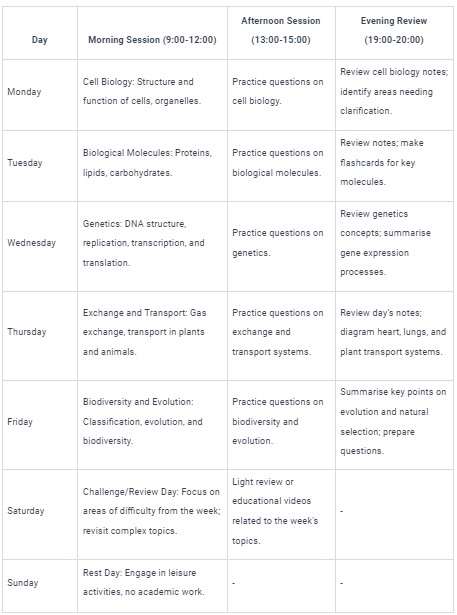How to Pass A-Level Biology – A Guide For Students
Is A-level Biology Hard?
First of all, A levels are a big step after GCSEs in general. And A-level biology is not exactly famous for its easy curriculum.
People estimate that A-level biology is 2-3 times harder than GCSE biology, even though it’s relatively easy than other A-level sciences. Reflecting on recent statistics, the rigour of A-level biology is evident in its grading trends. In 2023, only 25.9% of A-level biology students achieved an A or A*, a slight increase from 23.5% in 2019 but a notable decrease from 33.8% in 2022.
A-level biology needs a lot of independent work and memorising many complex topics. However, this is a very well-respected subject and can lead you to a great career in the future. Hence, the effort is worth it! 🔬
What Kind of Background is Necessary to Study A-level Biology?
A-level biology is not an easy subject! A good background in biology is necessary. If you have not studied biology before on a deeper level, then it would be a good idea to prepare yourself beforehand. This will help you understand the content better as well as allow you to get started quickly. it’s helpful to familiarise yourself with the AQA A Level and AS Biology specification to understand exactly what topics you’ll need to learn and how the assessment works.
Some specific skills and knowledge that may be helpful to have before starting A-level Biology include:
🧬 Basic understanding of the scientific method and how to design and carry out experiments
🧬 Familiarity with basic biological concepts such as cells, genetics, and evolution
🧬 Knowledge of maths and statistical principles, as these, may be used to analyse data and make calculations in biology
🧬 Familiarity with basic chemistry concepts, including atomic structure and chemical reactions
🧬 Understanding of basic physics principles, such as energy and forces, as these may be applied in the study of biology
How to Get an A in A-level Biology
f you’re wondering how to get a in a level biology, it requires strategic planning, consistency, and effective revision techniques. Here are some steps to help you achieve that top grade:
1. Make a Revision Plan to Avoid Procrastination
How to revise Biology? As you can imagine, it is very important to revise before your exam. However, if you have not been revising at all or have started too late, it may seem impossible to catch up. The good news is that you can still study effectively if you create a revision plan and stick to it throughout the exam period.
Here are some tips:
🧬 Plan your revision time in advance with plenty of flexibility built in so that if something comes up (e.g., illness), then there’s enough time for recovery without jeopardising your exam performance.
🧬 Write down exactly what topics will be covered in each section of the exam so that when planning your study schedule, you know exactly where to focus on particular areas of weakness first before moving on to more familiar topics later on when appropriate.
🧬 Procrastination is one of the biggest enemies of success. It’s easy to put off studying for a test until the last minute and then cram, but it can be difficult to focus when you’re overwhelmed by everything you need to learn.
🧬 Analyse where is your procrastination coming from. Is it perfectionism, exam anxiety, learning difficulties such as ADHD or other reasons? Then try to make a study plan that will work for YOU.
Here is a sample for your A-level biology revision timetable to set the foundation for your studying sessions:

2. Start Your Revision Early – Preferably Now!
Many A-level students often ask “how early should I start revising for A-levels” and the answer is now! 📗Whether you’re in the first year of your sixth form, or the second, it’s never too early to start revising. check the syllabus on the exam board’s website and start planning now.
The best way to avoid procrastinating on your studies is to start early so there’s plenty of time for revision and review before exams. If you have an upcoming exam in a few days’ time and haven’t started revising yet, it could be wise for you not only to begin working on your revision plan. Make the best of your time! Do not worry, it does not help (sadly…).
3. Choose a Revision Strategy that Really Works
It’s important to choose a revision strategy that works for you. Some students find it helpful to use a combination of strategies. Whilst others prefer to stick with one method. The best way forward is to try different methods. This is why it’s important to start early. You’ll have enough time to experiment! 🔎
You might want to consider whether or not there’s a specific learning style involved when choosing your revision strategy. For example, if you learn best from visuals then using flashcards or mind maps might be better than making lists of facts. However, this may not be true if you find yourself more comfortable using written notes instead.
4. Check Your Knowledge with Relevant Questions and Past Papers After Every Topic
After every topic you complete, check your understanding of the topic by answering any questions that were included at the end of your textbook chapter. If there are no questions included, then make sure to write down a few review questions and answers on flashcards and test yourself. You can use Anki for creating flashcards.
Another way to prepare is practicing a level biology past papers from prior years’ exams. Find out which topics are covered in these exams so that you can review those specific areas.
5. Talk to Someone Who Already Got A* on Their A-Level Biology
The next step is to talk to someone who already got an A* on their A-level Biology. They will be able to tell you how they did it and what they would do differently if they could start again. Ask them what they found difficult or tricky about the subject. Also, how they dealt with certain topics throughout their coursework assignments or exam prep sessions.
However, don’t forget that every person has different circumstances. Hence, not everything they say will be relevant to you!
Some Mistakes to Avoid
1. Don’t Do Practice Tests Without Knowing the Material First
You could spend hours upon hours doing practice tests without improving the subject. And that’s not a good use of your time.
The best way to prepare for an exam is by learning the material first and then taking practice tests after you know the information.
2. Don’t Spend too Much Time on Making Your Notes Pretty
Don’t spend too much time making your notes look nice. Just write down what you need to know and don’t worry about making it look pretty.
What are the benefits of this? Well, firstly, if you’re not overly worried about how the information is presented on paper then there’s no reason for you not to take lots of notes! Secondly, if you make all your cards in one go at the end of each section then they’ll be perfect for memorising during revision later.
Many students put off studying for exams because they are concerned about the appearance of their notes. This can lead to delays in revision and ultimately lower exam performance.
3. Don’t Waffle on Exam Questions
You should never write too much, but you should never write less than necessary either. You don’t want to waffle on exam questions and give the impression that you don’t know what you are talking about. If a question asks for an explanation of some aspect of biology, then it is important that you answer this question fully and completely in your answer.
For example, if the examiner has asked for an explanation of DNA replication, then there is no need to go into detail about how it was first discovered because this information is not relevant to the exam paper. Instead, focus on explaining how DNA replication works (which is what was asked for) rather than getting distracted by irrelevant details such as when Watson and Crick first worked out how it worked or where they got their inspiration from.
What Happens After A-Levels?

A-levels are the first step for many students when it comes to higher education. They’re also very useful in getting a job after university as employers often want to see good a level grades from previous exams.
If you want to go to university, there are a number of different courses that you could apply for. If you’re interested in medicine or dentistry, you should apply for medical or dental school respectively. If instead, you want to study subjects like science and engineering, then there are lots of different degrees available at universities across the country.
🧬 Set realistic goals and deadlines. If you’re looking at applying to Oxbridge (or another top university), don’t set yourself unrealistic expectations. Look at what you need in order for your application to stand out from the crowd, and work towards that goal over a period of time.
🧬 Start drafting your personal statement early so that there is enough time to make it perfect.
🧬 Even if your predicted grades are high, there is no harm in preparing for UCAS clearing. Clearing matches students with courses that still have places left. Even though clearing has a reputation for being easy, it’s not like that! It’s better to prepare for it thoroughly.
Need Help with Passing A Level Biology?
A-level Biology is a challenging subject that requires a significant amount of dedication and preparation, particularly for those who did not take triple science at the GCSE level. It can be difficult for students to maintain motivation over the course of two years, but having a solid study plan in place can help. It’s important to remember that the hard work you put in now can pay off in the future, as good A-level grades can open up a range of opportunities.
Join different communities where you’ll be able to ask questions about Biology. You can find groups like that on Reddit or Facebook.
If you need someone to help you during your preparation, you can get a tutor who already did A-level Biology and got an A*. There are many great online tutoring services, one of them being Edumentors. All Edumentors’ tutors are from top UK universities such as Cambridge, Oxford, Warwick and others. They have already gone through A-levels and can help you with mastering exam techniques, dealing with exam anxiety and helping you understand difficult topics in Biology. These A-level Biology tutors can also provide career guidance, and university application assistance and help you get into your first choice university!
You Might Be Interested In
How to Revise for A-level History – Get A*
How To Revise For A-level Maths – Get an A*









